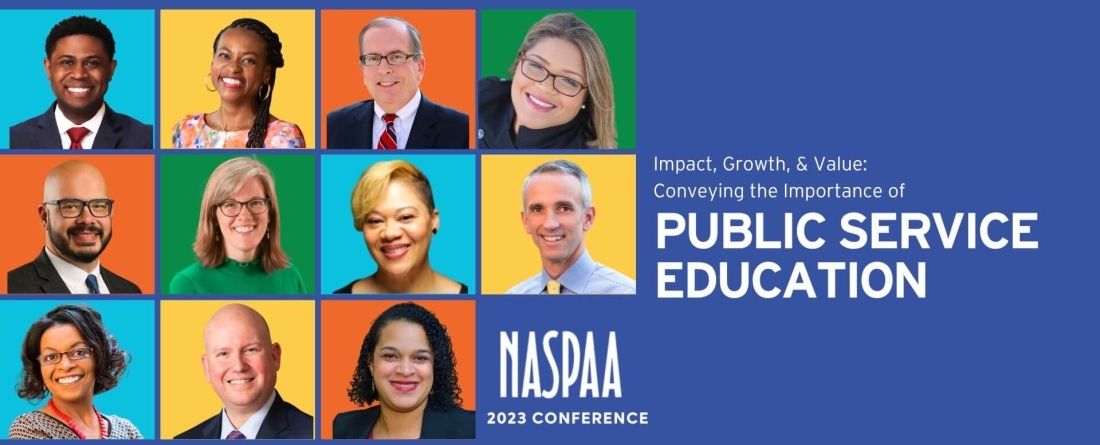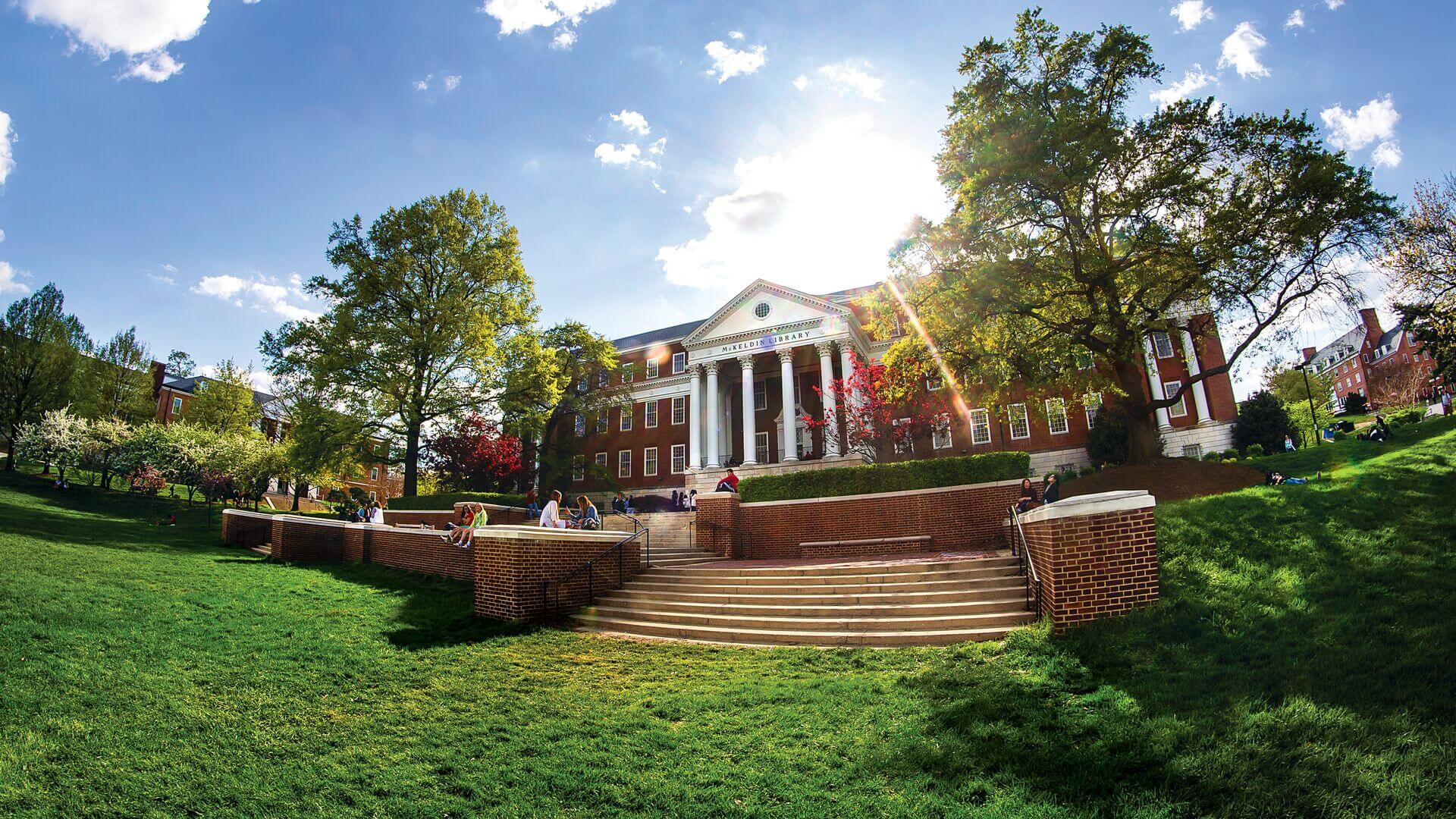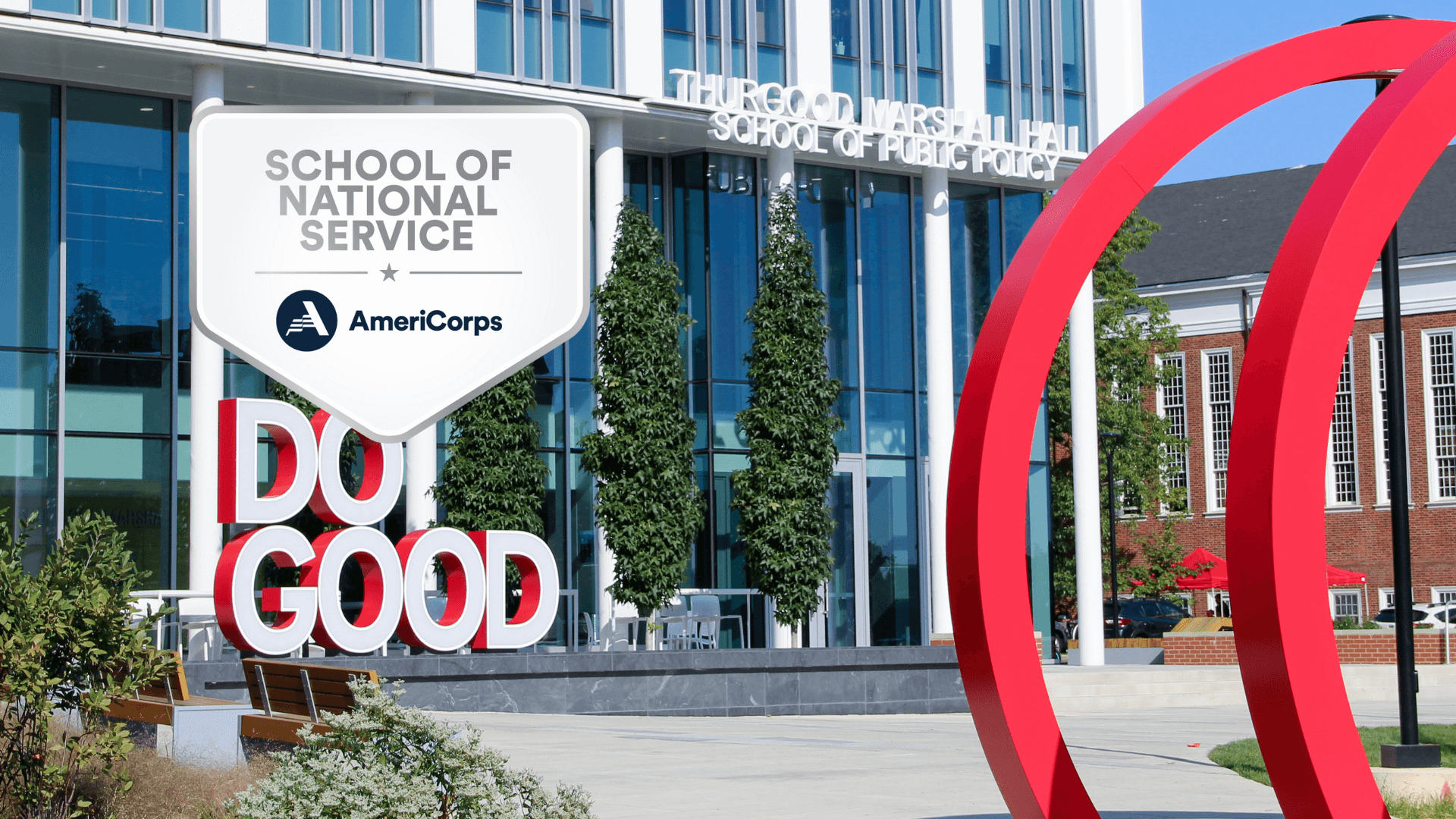
This year’s NASPAA conference theme was “Impact, Growth, and Value: Conveying the Importance of Public Service Education.” 156 schools across 6 countries gathered in Pittsburgh, PA from October 11-13 to learn from each other, foster connections in public policy and affairs and celebrate public service and public service education.
University of Maryland School of Public Policy’s distinguished group of 10 faculty and staff members served as panelists or conveners across a total of 10 engaging panel discussions. Topics ranged from civic engagement to undergraduate and career programming to social and racial justice in academia.
In the pre-conference workshop Undergraduate Core Competencies: What Do Undergraduates Need from Public Affairs Programs?, Director of Undergraduate Studies Jennifer Littlefield served as convener as panelists discussed critical core competencies in the field of public affairs undergraduate education. They also discussed the importance of ensuring that undergraduates pursuing public affairs careers have the skills and resources they need to pursue their chosen career path.
During the conference panel Leveraging Research Centers and Institutes to Strengthen the Infrastructure of Public Service Education, Conference Co-Chair and Research Director of the Institute for Public Leadership Cullen Merritt served in the role of convener while Director of the Do Good Institute Robert Grimm and Director of the Institute for Public Leadership John Ronquillo served as panelists. Merritt shared that “oftentimes there are underrepresented students who don’t feel that they have access to centers and institutes” and emphasized the urgency in making those students feel more included. Grimm discussed the importance of experiential learning, and supporting students’ efforts inside and outside of the classroom to “help make the biggest impact possible with whatever they are passionate about.” He also emphasized offering a pathway to get financial support in the form of mini grants so students can advance their projects. Stressing the importance of looking at the multifaceted attention spans of students, Ronquillo observed that “they are interested in everything in the best of ways.” He also talked about a “Maryland moment” in public leadership – not being insular and siloed, not being owned or co-opted by any one area, and building collaboration with other Schools across campus.
In the panel Resources for Developing and Implementing an Undergraduate Public Affairs Program, Associate Dean of Academic and Student Affairs Nina Harris served as a panelist and discussed the Bachelor of Arts in Public Policy that the School launched in 2017. Noting that over two thirds of incoming Maryland students are undeclared, Harris highlighted the need for a new budget model that supports and provides direct resources to the School and offers more aid to out of state students. Harris also talked about interdisciplinary cross-college degrees and partnerships, observing that public policy is “a great complementary major to any other major” and that there isn’t any area that doesn’t have a policy component. Dean Robert C. Orr commented, “What is very clear is that we all operate in budget models. We all have to maximize resources. We all need to be better at networking across schools when it comes to accreditation.” Orr continued, “This kind of a conversation is a great way to find others in the room with the same budget model.”
Professor Phil Joyce participated in a panel discussion on Incorporating Social Equity into Public Budgeting and Finance Classes which explored the learning outcomes, assignments and techniques used to incorporate social equity successfully. Joyce stressed the importance of teaching social equity in budgeting throughout the semester, noting, “Since public finance and budgeting are about who pays for and who benefits from policies, it is essential that issues of social equity be front and center.” Joyce discussed that, in his course, he teaches gender budgeting and the effect of budget policies on women; participatory budgeting and encouraging voices of the underserved in the budget process; and racial equity budgeting and producing budgetary decisions that have measurable impacts on reducing racial disparities.
In the panel Centering the Roles of Black Women While Teaching Public Service and Advocacy, Associate Clinical Professor Ebonie Johnson Cooper served as convener and started the discussion of roles of Black women in social change movements. Johnson Cooper highlighted several prominent Black women including civil rights activist Mary Church Terrell, gospel singer Mahalia Jackson and law professor and prominent Black Panther Party activist Kathleen Cleaver. Johnson Cooper shared that while white women earn 82% of the hourly earnings of white men, Black women earn just 65%. She also noted that Black women-led nonprofits earn less funding than white-led organizations.
In Moving Beyond the Performative: Institutionalizing Social and Racial Justice at All Levels of Academia, Director of Undergraduate Studies Jennifer Littlefield served as convener and Associate Clinical Professor Alana Hackshaw as a panelist, and the group discussed ways to operationalize social and racial justice commitments. Panelists discussed how most conservative students do not feel as though they can speak up. They also talked about incentivizing senior faculty members to mentor junior faculty members. Hackshaw shared, “Faculty may not pay attention to this as much but really understanding the university’s guidelines helps you understand the freedoms you have.” She also discussed how this can be an opportunity to amend best practices to ensure DEI is utilized. Littlefield discussed the general education curriculum that talks about structural racism and the need to start building our case at every level so that we are prepared when the critics come.
In the Cutting Edge Career Services: Enhancing Public Service Education Outside the Classroom panel, Director of Career Services and Alumni Relations Bryan Kempton shared the value of alumni networks, transferable skills, written and oral communication, teamwork and experiential learning opportunities. Kempton noted that the MPP allows graduates to pivot to various sectors, with 70% of University of Maryland alumni starting careers in the DMV area. Kempton also noted the importance of alumni surveys to reinforce career development principles and insights into critical networking connections between career services and alumni relations. “It’s always good to show that the work you think you’re doing bears weight.” Kempton also noted that student learning outcome assessments and student feedback for continual improvement are essential because practitioners are on the ground delivering the programs and we want and need that data.
In Cultivating Racially Diverse Leadership in Schools of Public Service, Associate Professor Niambi Carter served as a panelist and discussed the active role that academic leaders can play in addressing the racial disparities in university leadership. Carter shared, “A peak behind the curtain gives you a sense of what could be and what is possible.” When asked what barriers are unique to BIPOC scholars trying to advance in equity, Carter referenced a lack of networks, lack of sponsorship from senior scholars, structural and racial inequality, and that family wealth puts scholars of color at a disadvantage at universities. Carter shared, “Becoming the face of diversity in your space is something that happens often.” Speaking about invisible service and mentoring, Carter said, “There are a lot of things we do that lend themselves well to leadership roles. … There are a wealth of skills we all have that are germane to the job.”
In The Critical Role of BIPOC School Leaders in Shaping Meaningful Experiential Learning Opportunities for Students (and Communities), Associate Dean of Academic and Student Affairs Nina Harris served as a panelist and talked about how her experiences helped to shape her vision for experiential learning and engagement with communities, and the tangible and intangible outcomes of experiential learning. Harris shared, “You cannot go into these communities to try to change them. … Let them be co-creators of whatever it is that you want to build.” She also talked about “otherness” and the need for students to learn and feel safe in a community that may not look like them. “There’s no ‘one size fits all’ for experiential learning.”
In the panel Achieving Community Impact through Public Service Partnerships, Director of Career Services and Alumni Relations Bryan Kempton highlighted approaches to engaging local communities, exploring stakeholder relationships which provide mutually beneficial outcomes for students, alumni, universities and communities, and local partnerships which reinforce community outreach, cross train students across multiple sectors and create career development opportunities that complement classroom public service education. Kempton referenced the Robertson Foundation Fellows Program (federal); the Maryland Department of Legislative Services Fellows Program (state); the Maryland Municipal League Internship and Scholarship Awards (local); the McLarty Associates Fellows Program (private) which is currently on hiatus; the Dean’s Internship Award (DEI focus); and the SPP Internship Program (nonprofit and government).
The conference fostered connections, insights and shared dedication to the field of public service education. Conference attendees showcased their commitment to building a more equitable, informed and engaged society that will continue to shape the future of public affairs and administration around the globe.



